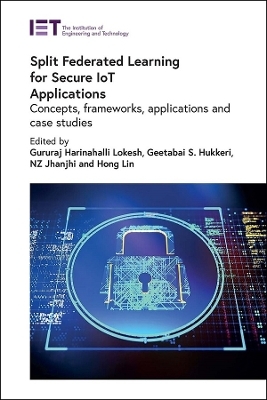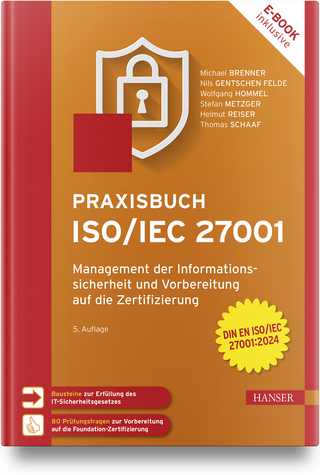
Split Federated Learning for Secure IoT Applications
Institution of Engineering and Technology (Verlag)
978-1-83953-945-9 (ISBN)
New approaches in federated learning and split learning have the potential to significantly improve ubiquitous intelligence in internet of things (IoT) applications. In split federated learning, the machine learning model is divided into smaller network segments, with each segment trained independently on a server using distributed local client data.
The split learning method mitigates two fundamental drawbacks of federated learning: affordability, and privacy and security. When running machine learning computation on devices with limited resources, assigning only a portion of the network to train at the client-side minimizes the processing burden, compared to running a complete network as in federated learning. In addition, neither client nor server has full access to the other, which is more secure.
This book reviews cutting edge technologies and advanced research in split federated learning. Coverage includes approaches to realizing and evaluating the effectiveness and advantages of federated learning and split-fed learning, the role of this technology in advancing and securing IoTs, advanced research on emerging AI models for preserving the privacy of the data owned by the clients, and the analysis and development of AI mechanisms in IoT architectures and applications. The use of split federated learning in natural language processing, recommendation systems, healthcare systems, emotion detection, smart agriculture, smart transportation and smart cities is discussed.
Split Federated Learning for Secure IoT Applications: Concepts, frameworks, applications and case studies offers useful insights to the latest developments in the field for researchers, engineers and scientists in academia and industry, who are working in computing, AI, data science and cybersecurity with a focus on federated learning, machine learning and deep learning.
Gururaj Harinahalli Lokesh is an associate professor in the Department of Information Technology and the founder of the Wireless Internetworking Group (WiNG) at the Manipal Institute of Technology, Bengaluru, India. His research interests include blockchain technology, cyber security, wireless sensor networks, ad-hoc networks, IoT, data mining, cloud computing and machine learning. He is an editorial board member of the International Journal of Blockchains and Cryptocurrencies. He has published over 110 research papers in international journals and presented 20 papers at international conferences. He is a senior member of the IEEE, lifetime member of ISTE and CSI, a professional member of the ACM and an ACM distinguished speaker. He holds a PhD degree in Computer Science and Engineering from Visvesvaraya Technological University, Belagavi, India. Geetabai S. Hukkeri is an assistant professor in the Department of Computer Science and Engineering at the Manipal Institute of Technology, Bengaluru, India. Her research interests include artificial intelligence, deep learning, machine learning, big data, computer vision and multimedia information retrieval. She is a member of ACM. She holds a PhD degree in Computer Science and Engineering from Visveswaraya Technological University, Belagavi, India. N.Z. Jhanjhi is a professor at the School of Computer Science, Taylor's University, Malaysia, and is the program director for Postgraduate Research Degree Programmes in Computer Science. Additionally, he directs the Center for Smart Society (CSS5), playing a crucial role in advancing research and academic excellence at the university. He is a distinguished academician, researcher and scientist in computer science, specializing in cybersecurity. Globally recognized among the top 2% of research scientists and ranked among the top three computer science researchers in Malaysia, Prof. Jhanjhi was named an Outstanding Faculty Member by MDEC Malaysia in 2022. His extensive research contributions are reflected in his highly indexed publications in prestigious journals, with a collective research impact factor exceeding 1000. He has authored and edited over 50 research books with renowned publishers including Springer, Elsevier, Taylor and Francis, Wiley and IGI Global USA. Hong Lin is a professor of Computer Science at the University of Houston, Downtown, TX, USA, where he has established the Grid Computing Lab through an NSF MRI grant. He previously worked on large-scale computational biology at Purdue University and network security at Nokia, Inc. His areas of research include parallel computing, multi-agent systems and affective computing. He has published over 100 research papers in international journals and conferences. He is a senior member of the ACM. He holds a PhD in Computer Science from Purdue University, USA.
Chapter 1: Introduction to federated learning, split learning and splitfed learning
Chapter 2: Splitfed learning processing for IoT and Big Data applications
Chapter 3: Blockchain-driven splitfed learning for data protection in IoT setting
Chapter 4: Splitfed learning methods for natural language processing
Chapter 5: The role of splitfed learning in recommendation systems
Chapter 6: Reconfigurable intelligent surface (RIS)-inspired splitfed learning for over-the-air
Chapter 7: Enhancing computational performance in healthcare through federated learning approach
Chapter 8: Splitfed learning for multimodal emotion detection
Chapter 9: Split federated learning-based educational data analysis
Chapter 10: Splitfed learning for smart transportation
Chapter 11: Splitfed learning for smart grids
Chapter 12: Splitfed learning for smart agriculture
Chapter 13: A case study on splitfed learning implementation
Chapter 14: Conclusion and future directions
| Erscheinungsdatum | 03.10.2024 |
|---|---|
| Reihe/Serie | Security |
| Verlagsort | Stevenage |
| Sprache | englisch |
| Maße | 156 x 234 mm |
| Themenwelt | Informatik ► Netzwerke ► Sicherheit / Firewall |
| Informatik ► Weitere Themen ► Hardware | |
| ISBN-10 | 1-83953-945-3 / 1839539453 |
| ISBN-13 | 978-1-83953-945-9 / 9781839539459 |
| Zustand | Neuware |
| Haben Sie eine Frage zum Produkt? |
aus dem Bereich


